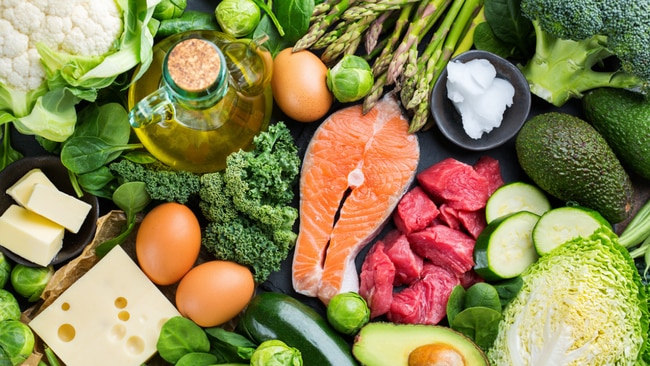How to finally ditch the cycle of restrictive eating, according to Jess Sepel
Despite the allure of fad diets, they don't work

Lifestyle
Don't miss out on the headlines from Lifestyle. Followed categories will be added to My News.
Nutritionist and author Jess Sepel debunks every myth you've ever heard about restrictive diets, and shares the pillars of the 'anti-diet' we should strive for instead.
If you haven't already been swept up in the JSHealth wellness wave, let us introduce you to its founder, Jess Sepel.
Sepel is a best-selling author and the powerhouse behind her namesake wellness empire, which embraces Sepel's philosophy of nurturing your body, celebrating balance, and cultivating a lifelong romance with food and fitness.
Sepel's candid journey isn't solely based on textbooks or scientific studies (though her approaches are.) Her philosophy sprang out of her own personal battles — the highs and lows of her relationship with food and the quest for genuine, sustained wellbeing.
Who better to bring attention to the dangers of passing diet trends and the negative consequences of a restriction-centric mindset? These are the foundations of the "anti-diet" movement, as told by Sepel.
Like what you see? Sign up to our bodyandsoul.com.au newsletter for more stories like this.
The main problem with fad diets
Despite the allure of fad or crash diets, Sepel quickly expresses her concerns about them, which she recognises occur on both "a physical and psychological level." "Moving away from this kind of restriction is a topic I am incredibly passionate about," she adds.
Delving deeper, Sepel explains that extreme dieting and the deprivation that comes with it can throw your metabolism off balance, wreak havoc with your blood sugar and energy levels, disturb hormone balance, and even take a toll on your emotional wellbeing. They induce “a horrible cycle that can include cravings and malnutrition,” she confirms.
The dangers of food restriction aren't just in the denial of a slice of cheesecake or a serving of chips. It’s the catalyst for a domino effect: binge eating episodes followed by self-imposed food punishment. This tug-of-war can have far-reaching consequences for our relationship with food and our metabolic health.
According to Sepel, this cyclical dieting disaster frequently leads to "a very complex relationship with food and one's own body," an unhealthy dance of binge eating followed by more stringent restrictions.
Instead, she invites her community to forego the allure of quick-fix diets and join her in "the anti-diet movement" searching for a more "sustainable, kind, and enjoyable lifestyle around wellbeing."

Fight the allure of fad diets
With each swipe and click across any social media platform, there seems to perpetually be a new diet awaiting trial. But Sepel begs you to examine the physical and emotional costs we often overlook.
Sepel cites research that suggests crash dieting "can impact your hormones and metabolism long term," as well as have adverse effects on cortisol, the stress hormone linked with dieting, which "has been shown to impact blood sugar hormones and thyroid function which can lead to metabolism damage,” she explains.
Diets alter blood sugar stability, and the increased peaks and troughs trigger "intense cravings... binge eating and unhealthy food choices." They strain rather than support our general health, and research suggests "they impact our metabolism long term," Sepel shares.
Fad dieting also encourages a reduction in macronutrients (carbohydrates, proteins, and fats). More than just filler words on a nutrition label, according to Sepel, are "essential for blood sugar management, metabolism, and energy production."
By omitting them, Sepel warns, you're depriving our bodies of important nutrients and minerals and establishing a problematic connection with food. Since“cutting food groups out in the long term could lead to malnutrition while creating unhealthy complexes around food.”

How to ditch the cycle of restrictive eating
In a never-ending cycle of diets and wellness trends, it is all too easy to fall into the trap of strict dieting, criticising, and pushing our bodies to their limits. Sepel knows this first-hand.
“I realised I couldn’t go on like that - torturing myself and treating my body harshly. I knew there had to be another way… a way to love myself and feel good,” she confides. And the revelation prompted her to practise self-love, kindness, and balanced, adaptable nutrition. "It wasn't easy, but it was absolutely worth it."
It helped her in establishing the JSHealth approach, which continues to inspire and support others today to never deprive themselves of the meals they enjoy.
"Eat the gelato and have that slice of pizza," Sepel urges. The secret? “Eat them mindfully, savour the moment, and then continue on without any guilt. This is what will help set you free!” she explains. After all, “The body can handle anything in moderation.”
Alternatives to restrictive eating
Sepel reinforces that "eating with balance... is the only thing that works long term." Balance isn't just a passing fad; it's the cornerstone of wellbeing. It's by championing balance over restriction we liberate ourselves and cultivate an empowering relationship with food.
It's critical to conceive of improving your health as a marathon, not a sprint, whereby "The goal is slowly and surely." But there is one significant step in that journey Sepel encourages you to make- saying goodbye to your scales.
Sepel recognises that it may not be able to be accomplished fast, noting that it took her "a long time to build up a better relationship with my body." But it is possible to stop labelling foods as 'off-limits' and instead enjoy them guilt-free; it only takes patience and persistence.
The JSHealth approach is centred on rekindling the important connection between us and our relationship with food, “reducing the need to restrict or resort to fad diets or the diet mentality.” By avoiding restrictive diets and focusing on a "healthy balanced diet - with ALL the foods," we serve our bodies and minds.
The one trick to helping you keep a balanced diet
Sepel recommends one snack ritual that everyone can follow: the JSHealth 4pm snack, which she describes as "a game changer." Mid-afternoon fueling guarantees that your blood sugars do not plunge before dinner, "helping you maintain energy and avoid sugar cravings caused by dips in blood sugar levels."
Some of Sepels' favourite nourishing options include a cup of herbal tea paired with nuts and dark chocolate, the refreshing crunch of veggie sticks with dip, or the delightful blend of coconut or Greek yoghurt mixed together and adorned with berries and seeds. A protein smoothie or shake, a slice of seeded toast with avocado, handmade bliss balls or JSHealth Nourish Bar, and rice cakes topped with nut butter and sliced banana are also tasty options.
But, wait, it's not just about the food. Sepel suggests taking a "30-minute switch off," or what she refers to as the "Stress-Free Zone (SFZ)."Sepel will sometimes close the door, put her legs up the wall and rest, or perform some moderate yoga or a meditation from the JSHealth App during this purposeful, non-negotiable stop.
In every mouthful and every breath, this mid-afternoon combo of a protein snack and a nervous system rest guarantees better balance and rounded self-care.
More Coverage
Originally published as How to finally ditch the cycle of restrictive eating, according to Jess Sepel




